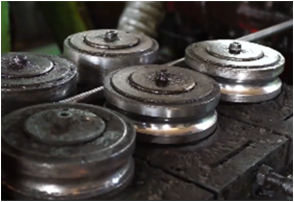नवम्बर . 29, 2024 10:41 Back to list
Exploring Various Categories of Bolt Fasteners for Diverse Applications and Industries
Different Types of Bolt Fasteners
Bolts are critical components used in various applications, ranging from construction and automotive industries to machinery and appliances. They serve as fasteners that hold different materials together, providing strength and stability. In this article, we will explore the different types of bolt fasteners, their characteristics, and their applications.
1. Hex Bolts
Hex bolts are among the most commonly used types of bolts. They feature a hexagonal head that allows for easy gripping and tightening with a wrench. Typically made from steel, they are used in a variety of applications, including construction and automotive assemblies. Hex bolts do not have a specific locking mechanism, so they are often paired with nuts and washers to ensure a secure fit.
2. Carriage Bolts
Carriage bolts have a unique rounded head and a square portion underneath that helps prevent the bolt from spinning when tightened. This design makes carriage bolts ideal for use in wood and other materials where a secure fit is necessary. They are commonly used in furniture, decking, and other constructions that require a smooth finish.
3. Lag Bolts
Lag bolts, also known as lag screws, are heavy-duty fasteners designed for wood applications. They have a sharp point and coarse threads that allow them to penetrate the wood easily. Lag bolts are often used in structural applications, such as attaching wooden beams or heavy components to each other. Due to their size and strength, they provide a robust hold, making them ideal for heavy construction.
Shoulder bolts, or shoulder screws, have a unthreaded shoulder that provides a precise bearing surface. This feature allows for pivoting or rotating applications, meaning they are often used in machinery or equipment where rotation is required. Shoulder bolts are available in various sizes and materials, offering versatility for different engineering needs.
5. Flange Bolts
different types of bolt fasteners

Flange bolts have a built-in washer-like flange beneath the head. This design helps distribute the load over a larger surface area, reducing the risk of damage to the material being fastened. They are often used in applications where space is tight or in situations where a washer might not fit. Flange bolts are common in automotive applications and machinery assembly.
6. U-Bolts
U-bolts are shaped like the letter U and are primarily used to secure pipes and other cylindrical objects. They are often formed from round or square bars of steel and come in various sizes. U-bolts are widely used in automotive systems, especially in suspending chassis, as well as in plumbing and construction to secure fittings and braces.
7. Eye Bolts
Eye bolts are designed with a loop or 'eye' at the top, making them suitable for lifting applications. The eye allows for a hook or rope to be attached, enabling the fastening of loads in construction, shipping, and rigging. Eye bolts can be found in both permanent and removable applications, adding versatility.
8. T-Bolts
T-bolts have a T-shaped head that allows them to slide into a channel or slot, providing a secure connection. This feature makes them ideal for applications where components need to be adjusted or repositioned. T-bolts are commonly found in construction, manufacturing, and furniture assembly.
9. Self-Tapping Bolts
Self-tapping bolts have sharp threads that allow them to create their own hole as they are driven into a material. This eliminates the need for pre-drilling, offering convenience and speed in assembly. They are commonly made from steel or stainless steel and are used in lighter applications, such as in home appliances or electronic devices.
Conclusion
Understanding the different types of bolt fasteners is essential for selecting the right one for specific applications. Each type has unique characteristics that cater to various needs, whether it's for structural integrity, ease of installation, or the requirement for mobility. By choosing the appropriate bolt, one can ensure the longevity and safety of the assembled components. Whether you are a professional in construction or simply a DIY enthusiast, having knowledge about bolt types and their applications can significantly enhance your project outcomes.
-
The Ubiquitous Reach of DIN934 in Application Realms
NewsMay.16,2025
-
Exploring Different Bolt Types
NewsMay.16,2025
-
Cracking the Code of Sleeve Anchor Mastery
NewsMay.16,2025
-
Clamp Design Principles,Types and Innovations
NewsMay.16,2025
-
Artistry Inspired by the Humble Anchor Bolt
NewsMay.16,2025
-
A Deep Dive into Screw Types
NewsMay.16,2025


